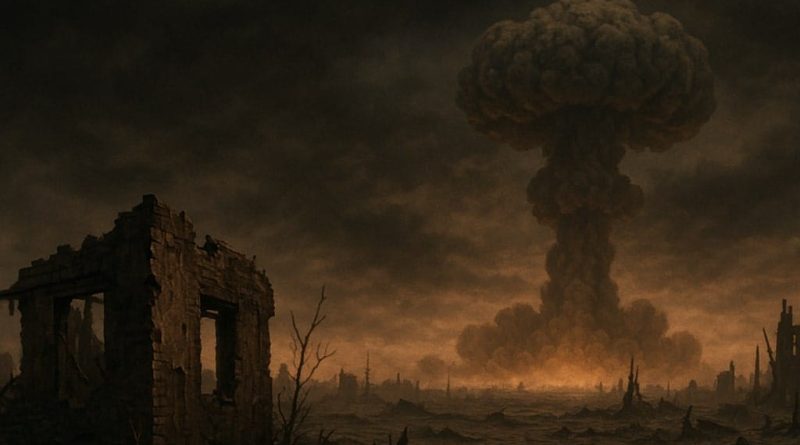Should Nuclear Weapons Ever Be Used?
Nuclear weapons represent the pinnacle of human destructive capability, a Pandora’s box that, once opened, could unleash devastation on an unimaginable scale. The question of whether these weapons should ever be used is not just a matter of military strategy but a profound ethical and existential dilemma.
The Immediate Horror of Nuclear Detonation
The moment a nuclear weapon is detonated, the effects are instantaneous and horrifying. Within seconds, a blinding flash of light and an intense wave of heat would incinerate everything in its immediate vicinity. Major cities, hubs of culture, history, and civilization, would be reduced to rubble in mere hours. Entire regions with millennia of shared heritage could vanish, leaving behind nothing but ash and memories. The destruction would be indiscriminate, sparing no one—men, women, children, the elderly—all would face the same merciless fate.
The explosive power of modern nuclear arsenals dwarfs the bombs dropped on Hiroshima and Nagasaki in 1945. A single warhead today could annihilate a metropolis, flattening infrastructure and erasing landmarks that define human achievement. Imagine the cultural loss: museums, libraries, and historical sites turned to dust, erasing centuries of progress in a heartbeat. For those searching for reasons why nuclear weapons should never be used, this immediate, total destruction is a chilling reminder of the stakes involved.
The Fallout: A Life of Unimaginable Misery
For those who survive the initial blast, the aftermath would be a nightmare beyond comprehension. Nuclear fallout, the radioactive debris that spreads through the air and settles over vast areas, would contaminate water, soil, and food supplies. Survivors would face a life of unimaginable misery, grappling with radiation sickness, cancer, and genetic mutations that could affect generations. The environment itself would become hostile, with once-fertile lands rendered barren and ecosystems collapsing under the weight of radioactive poison.
Beyond the physical toll, the psychological impact would be profound. Survivors would live in a world of constant fear, mourning the loss of loved ones and the life they once knew. Social structures would crumble, replaced by chaos and desperation as resources dwindle. For anyone researching the long-term consequences of nuclear weapons, it’s clear that survival would not mean salvation—it would mean enduring a slow, painful decline in a world stripped of hope.
Global Implications: A Shared Catastrophe
A nuclear war would not be confined to the belligerent nations. The concept of “nuclear winter” suggests that the smoke and soot from widespread fires caused by nuclear explosions could block out the sun, plunging the planet into a prolonged period of darkness and cold. Global temperatures could plummet, leading to crop failures and mass starvation even in regions untouched by the initial blasts. The interconnected nature of our world means that no one would escape the consequences—economies would collapse, trade would halt, and billions could face famine and disease.
This global fallout underscores why the question “should nuclear weapons ever be used” must be answered with a resounding no. The risk of escalation is too great; a single strike could trigger a chain reaction, drawing in other nations and leading to mutual assured destruction. For those exploring the broader impacts of nuclear war devastation, the message is clear: this is not a regional issue but a planetary one, threatening the very survival of humanity.
The Ethical Imperative: Preventing the Unthinkable
Given the catastrophic consequences, the use of nuclear weapons cannot be justified under any circumstances. The ethical imperative to prevent such a disaster outweighs any political or military rationale. Diplomacy, dialogue, and disarmament must take precedence over the temptation to wield these weapons as tools of power or deterrence. History has shown that humanity can resolve conflicts without resorting to annihilation—think of the Cold War, where the specter of nuclear war loomed large, yet cooler heads prevailed through negotiation and restraint.
For readers searching for arguments against nuclear weapon use, consider this: the cost of even a limited nuclear exchange would be measured not just in lives lost but in the erasure of our shared future. We must advocate for policies that reduce nuclear stockpiles, strengthen international treaties like the Treaty on the Non-Proliferation of Nuclear Weapons, and foster global cooperation to ensure these weapons remain unused.
A Call to Protect Our Future
The consequences of nuclear war are beyond imagination—catastrophic in their immediacy and enduring in their misery. Within hours, entire regions could be annihilated, their history and culture reduced to rubble. For survivors, the fallout would guarantee a life of suffering, while the global ripple effects would endanger all of humanity. The question of whether nuclear weapons should ever be used must be met with unwavering resolve: never. As stewards of our planet, we have a duty to prevent this unthinkable disaster and protect the future for generations to come.
If you found this article on the consequences of nuclear weapons insightful, share it to raise awareness about the importance of peace and disarmament. Let’s work together to ensure that the horrors of nuclear war remain a warning, not a reality. For more discussions on global security and ethical dilemmas, subscribe to our website and join the conversation in the comments below.

